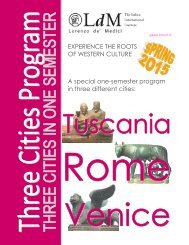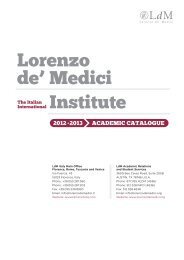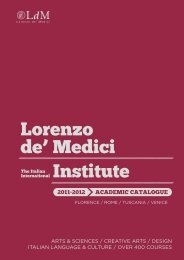aCademiC Catalog 2013-2014 - Lorenzo de Medici
aCademiC Catalog 2013-2014 - Lorenzo de Medici
aCademiC Catalog 2013-2014 - Lorenzo de Medici
Create successful ePaper yourself
Turn your PDF publications into a flip-book with our unique Google optimized e-Paper software.
FLORENCE<br />
School of Arts & Sciences<br />
Sport, Culture and Communication<br />
COM 282 F<br />
Cr: 3; Contact hrs: 45<br />
This course explores the various meanings of sport, how these<br />
meanings may be interpreted, and how sports fits into the<br />
larger context of society. Stu<strong>de</strong>nts will examine how sport can<br />
communicate cultural values, promote health, play an important<br />
role in prevention of chronic diseases and work effectively for<br />
social integration. Particular areas of interest inclu<strong>de</strong> sport in<br />
the context of the following: nationalism and civic pri<strong>de</strong>, health<br />
and wellness, social <strong>de</strong>viance, gen<strong>de</strong>r, race, social stratification,<br />
scholastic sport and higher education, and politics. Stu<strong>de</strong>nts will<br />
examine various texts and films that highlight the importance<br />
of sport in society. Special emphasis will be given to European<br />
and Italian approach to sports.<br />
Prerequisites: Sophomore standing<br />
Intercultural Communication<br />
COM 290 F; Dual listed: ANT 290 F<br />
Cr: 3; Contact hrs: 45<br />
The course, which introduces stu<strong>de</strong>nts to the basic patterns<br />
of cross-cultural psychology and communication, proposes<br />
an analysis of communication behavior in interpersonal and<br />
intercultural, individual and group environments. Along with a<br />
study of the influence of culture on i<strong>de</strong>ntity, viewpoints, and<br />
communication, it progressively proposes all the theoretical<br />
concepts that are necessary to analyze communication in<br />
an interpersonal and intercultural context. Topics inclu<strong>de</strong>:<br />
common communication difficulties, communication roles<br />
and proxemics. Special emphasis is placed on rituals, message<br />
patterns, clothing, myths, i<strong>de</strong>ologies, and on the influence of<br />
the mass media on our cross-cultural representation of reality.<br />
Prerequisites: Junior standing or concurrent enrolment in the<br />
International Conflict Transformation Certificate<br />
Conflict Resolution and Mediation Skills<br />
COM 292 F; Dual listed: PSY 292 F<br />
Cr: 3; Contact hrs: 45<br />
This intensive course grounds stu<strong>de</strong>nts in the theory of the<br />
methods of collaborative conflict resolution strategies and trains<br />
them to use those methods for a range of real-world situations.<br />
Central are techniques of proven professional effectiveness,<br />
in particular those of the National Conflict Resolution<br />
Center. The course inclu<strong>de</strong>s an overview of interest-based<br />
conflict resolution, effective communication skills (to prevent<br />
escalation), negotiation from a problem-solving (rather than<br />
competitive) perspective, approaches for managing conflicts<br />
in personal and professional settings, and a strategy for lea<strong>de</strong>rs<br />
on campuses, communities, and workplaces. Stu<strong>de</strong>nts further<br />
learn the art of formal mediation with individuals and large<br />
groups. Further techniques serve to <strong>de</strong>al with more intractable<br />
disputes in the realm of high-intensity, complex, and large-scale<br />
conflicts. In addition to a highly structured process, stu<strong>de</strong>nts<br />
learn culturally appropriate adaptations, how to manage<br />
impasse, and how to handle highly emotional people. Taught<br />
by NCRC instructors.<br />
Public Relations<br />
COM 300 F<br />
Cr: 3; Contact hrs: 45<br />
We will study the <strong>de</strong>finitions, functions and evolution of public<br />
relations, including the application of PR theory and ways to<br />
plan a PR campaign (planning process, issue analysis, research<br />
methods and strategies). The different fields in which public<br />
relations practitioners operate will be presented in relation to<br />
case studies and exercises: media relations, event management,<br />
crisis management, corporate i<strong>de</strong>ntity, internal/external<br />
communications, community relations, international PR and<br />
marketing support, and effectiveness evaluation. Finally, future<br />
perspectives and new technological opportunities will be taken<br />
into account, trying to <strong>de</strong>fine new boundaries for a discipline<br />
too often un<strong>de</strong>rrated or misun<strong>de</strong>rstood.<br />
Prerequisites: COM 180 Mass Communication, or equivalent<br />
War and Media<br />
COM 301 F; Dual listed: POL 301 F / PST 301 F<br />
Cr: 3; Contact hrs: 45<br />
This course analyses the role played by the media in the<br />
evolution of national and international wars. We will investigate<br />
the extent to which the media either influence <strong>de</strong>cision-making<br />
about military interventions or serve as tools in the hands of<br />
government officials seeking to influence public opinion. A<br />
number of media-related phenomena will be studied including<br />
the CNN effect, agenda setting, real time policy, media diplomacy,<br />
media war, news management and propaganda, through the<br />
examination of key international conflicts, especially since<br />
1950. Several different topics will be explained to un<strong>de</strong>rstand<br />
the intersection between war and media: the proliferation<br />
of satellite technologies and the internet; the importance of<br />
the international TV networks (like CNN and al Jazeera); the<br />
role of still and moving images; the importance of journalists<br />
and journalistic routines; the relevance of press conferences,<br />
briefings, and official statements; the representation of war<br />
in movies and artists’ works; the media gap between “North”<br />
and “South”; the emergence of “non-Western” media; and also<br />
the spread of ethnic conflicts and terrorism, and the more and<br />
more asymmetric nature of war.<br />
Prerequisites: COM 180 Mass Communication, or HIS 130<br />
Western Civilization, or POL 150 Introduction to Political<br />
Science, or equivalents<br />
Broadcasting: Italian Culture and Television<br />
COM 305 F; Dual listed: CLT 305 F / SOC 305 F<br />
Cr: 3; Contact hrs: 45<br />
This course examines the <strong>de</strong>velopment of commercial<br />
television broadcasting, its beginnings in radio and its creation<br />
of distinctive genres in Italy. Italian state and private television<br />
are analyzed and compared. The course also consi<strong>de</strong>rs<br />
different theoretical approaches to the analysis of television by<br />
investigating the various theories of its effects and the impact<br />
on other media. The course will examine today’s main trends,<br />
strategies and broadcast in Italian television. A strong link is<br />
also provi<strong>de</strong>d between Italian television and Italian culture.<br />
Prerequisites: COM 180 Mass Communication, or equivalent<br />
Communications Internship: Web TV<br />
COM 361 F; Dual listed: FVM 361 F<br />
Cr: 3; Contact hrs: 135<br />
This course provi<strong>de</strong>s practical and professional experience in<br />
the field of Communications at a distinctive Italian placement<br />
site. The intern is monitored by both the onsite supervisor and<br />
an LdM faculty member. The gra<strong>de</strong> assigned by the faculty<br />
internship supervisor reflects assessment of weekly reports,<br />
two papers, and an overall evaluation. Ten hours weekly at the<br />
internship site; stu<strong>de</strong>nt internship schedules and onsite duties<br />
may vary. The placement is with the LdM Web TV offices;<br />
interns may <strong>de</strong>velop and carry out various types of ongoing<br />
and special activities which may inclu<strong>de</strong> but are not limited to:<br />
script writing, multimedia writing, interviews, research, vi<strong>de</strong>o<br />
work, editing, website management.<br />
Note: Placement opportunities are limited and subject<br />
to change. Stu<strong>de</strong>nts who enroll must submit supporting<br />
documentation by the registration <strong>de</strong>adline, and acceptance is<br />
conditional upon result of an onsite interview during the first<br />
week of the term. Fluency in Italian may be advantageous.<br />
Prerequisites: Communications/Journalism majors of junior<br />
standing<br />
Communications Internship<br />
COM 362 F<br />
Cr: 3; Contact hrs: 135<br />
This course provi<strong>de</strong>s practical and professional experience in<br />
the field of Communications at a distinctive Italian placement<br />
site. The intern is monitored by both the onsite supervisor and<br />
an LdM faculty member. The gra<strong>de</strong> assigned by the faculty<br />
internship supervisor reflects assessment of weekly reports,<br />
two papers, and an overall evaluation. Ten hours weekly at the<br />
internship site; stu<strong>de</strong>nt internship schedules and onsite duties<br />
may vary. The placement is with a private publishing company<br />
specialized in tourist information for Florence and Tuscany.<br />
Interns may <strong>de</strong>velop and carry out various activities which may<br />
60<br />
LdM Aca<strong>de</strong>mic <strong>Catalog</strong> <strong>2013</strong>-<strong>2014</strong>





